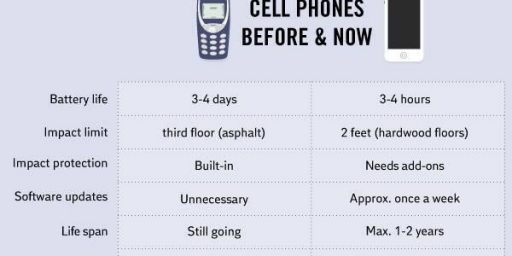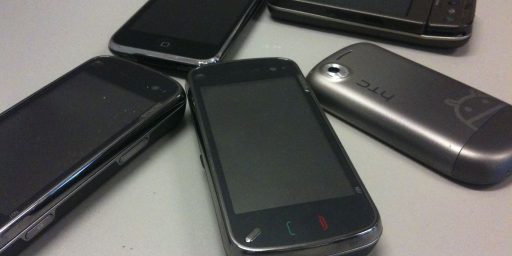SOMETHING ELSE TO WORRY ABOUT
Slate has a piece about another bit of mischievous technology:
Cell-phone jammers–already available on the Internet to security honchos and average Joes alike–are a surprisingly useful (and widely used) tool, and they could easily become as popular as cell phones themselves.
A cellular “security bubble” in London could have protected Bush from a very real threat: terrorists who use cell phones to detonate bombs from miles away, or even another country. By connecting a cell phone to hidden explosives, and then calling that phone, one can detonate a bomb (the electrical charge that activates the ringer on the cell phone serves as the triggering signal). In May 2002, Palestinian militants in Tel Aviv nearly caused a major explosion when they placed a bomb wired to a cell phone in a fuel truck headed for Israel’s largest fuel depot. (The bomb detonated, but the fire was put out.)
***
It is possible for intrepid consumers to acquire the same technology that’s used to create security bubbles around traveling dignitaries. Sites offer a wide range of jamming devices at reasonable prices. For instance, the SH066PL2A/B is a portable cell-phone jammer that sells for 169.99 British pounds ($293 dollars). The SH066PL2A/B will get you a security bubble of about 30 feet, and it’s camouflaged to look like a cell phone, so you can leave it out on a restaurant table and no one will know you’re the source of the blissful silence in the room.
***
The problem is that cell phones aren’t just for talking anymore. And as the industry continues to provide futuristic gadgets with dizzying capabilities, it will be tougher to make a case against all forms of interference. The prevalence of camera phones, to cite just one example, poses a new problem for industrial security experts eager to keep espionage-minded shutterbugs in the dark. One company, Iceberg Systems, is beta-testing a new technology that will remotely turn off the cameras in cell phones.
While the legality of this technology is unclear, odds are that the demand for such products will surge in the near future, as analysts predict that within five years there could be up to 1 billion camera phones in circulation worldwide. We may find ourselves in a “bottom up” surveillance society, where anyone can record anything, and send sound and image out to the Internet for those who want to watch and listen in.





